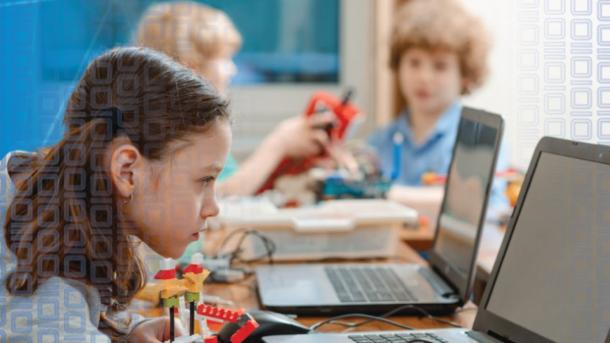العودة

Enhancing human-machine collaboration at digital learning week 2024
اليونسكو
2024 - 10 - 04
UNESCO launched the second edition of the Digital Learning Week 2024 at its headquarters in Paris under the theme "Steering Technology for Education." This landmark event held from 2 to 5 September 2024 brought together international and Arab education ministers, leading education experts, and technology specialists to explore the transformative potential of digital tools in education.

UNESCO launched the second edition of the Digital Learning Week 2024 at its headquarters in Paris under the theme "Steering Technology for Education." This landmark event held from 2 to 5 September 2024 brought together international and Arab education ministers, leading education experts, and technology specialists to explore the transformative potential of digital tools in education.
A key feature of the week was a high-level round table with education ministers, focusing on the integration of artificial intelligence (AI) into educational systems. The discussions centered on leveraging AI to advance Sustainable Development Goals (SDGs), ensuring its ethical use, and enhancing the learning assessment process.
On the occasion, UNESCO released two groundbreaking AI competency frameworks tailored for both teachers and school students. These frameworks are designed to enhance AI literacy and facilitate effective human-machine collaboration.
The event aimed to drive the digital transformation of education while aligning it with green transformation initiatives. Key objectives included empowering learners and raising their awareness of AI technologies, guiding teachers in effectively using AI in the classroom, and supporting learners in acquiring AI competencies as part of digital citizenship education.
Click here to access the AI competency frameworks for Teachers and discover the guiding principles designed to empower educators and students alike.
For more information about the Digital Learning Weed 2024, please visit: unesco.org .
أحدث المنشورات
القائمة الكاملةاليونسكو
المستقبل على المحك: لماذا الاستثمار في التعليم أمر بالغ الأهمية؟
يسلط هذا التقرير، الذي أعدّته اللجنة التوجيهية الرفيعة المستوى المعنية بالهدف الرابع من أهداف التنمية المستدامة (SDG4) بالتعاون مع الشراكة العالمية من أجل التعليم (GPE) ونُشر في عام 2024، الضوء على الحاجة المُلِحّة لتعزيز الاستثمار في التعليم كوسيلة أساسية لمواجهة التحديات العالمية، بما في ذلك تغيّر المناخ، والتطورات التكنولوجية، والتحوّلات الديموغرافية.
اليونسكو
المدن العربية تتألق في جوائز مدن التعلم لليونسكو لعام 2024
تُحرز المدن العربية تقدمًا كبيرًا في مجال التنمية المستدامة والتعلم مدى الحياة، مع تركيز متزايد على إنشاء بيئات تعليمية شاملة تُسهم في تحقيق الأهداف التنموية المحلية والعالمية. وقد احتفلت جوائز مدن التعلم لعام 2024، التي تُمنح من قِبَل اليونسكو، بهذه الجهود، مبرزةً المدن العربية التي تميزت في بناء مجتمعات تعليمية.
اليونسكو
مؤتمر اليونسكو العالمي الثالث للموارد التعليمية المفتوحة: تعزيز الوصول الشامل إلى المعرفة
انطلق مؤتمر اليونسكو العالمي الثالث للموارد التعليمية المفتوحة (OER) في 19 نوفمبر/تشرين الثاني 2024، في مركز دبي التجاري العالمي في دولة الإمارات العربية المتحدة، ليكون المرة الأولى التي يُستضاف فيها هذا الحدث في العالم العربي. نظّم مؤتمر اليونسكو بالتعاون مع مؤسسة محمد بن راشد آل مكتوم للمعرفة (MBRF)واستقطب أكثر من 500 مشارك ومشاركة من نخبة القادة العالميين، وصنّاع السياسات، وممثلي المؤسسات التعليمية، بما في ذلك وزراء، وأكاديميون، وخبراء من القطاع الخاص. وتركّزت المناقشات على مدار يومين حول تعزيز الاستفادة من الموارد التعليمية المفتوحة والتقنيات الناشئة، بهدف تحقيق وصول عادل وشامل إلى التعليم، وتقليص الفجوة الرقمية على الصعيد العالمي.
اليونسكو
الأمم المتحدة تحتفي في شهر ديسمبر/كانون الأول بحقوق الإنسان، والأشخاص ذوي الإعاقة، واللغة العربية
تُحيي الأمم المتحدة في شهر ديسمبر/كانون الأول ثلاث مناسبات بارزة تُعنى بحقوق الإنسان، وبحقوق الأشخاص ذوي الإعاقة، وباللغة العربيّة، ممّا يجعل هذا الشهر فرصةً عالميّةً للتفكير والعمل. وتقود اليونسكو الجهود لتعزيز التعليم الشامل، وحماية حقوق الإنسان، والاحتفاء بالإرث الثقافيّ واللغويّ للّغة العربيّة، من خلال سلسلة من الفعاليات والمبادرات.